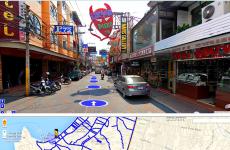Bali what you need to know. Holidays in Bali: what is important to know
BEFORE DEPARTURE
Before leaving for the airport, be sure to check that you have the following documents:
- International passports;
- Air tickets (you can read more about air travel to Bali )
- Insurance poles;
- Confirmation of hotel reservation;
- Certificate from the bank for the export of currency (if you are exporting more than $3,000 per person);
- Driver's license (if you plan to rent a car);
- A power of attorney from both parents (for children traveling without parents) or a power of attorney from the second parent (for children traveling with one of the parents);
- A photocopy of the child’s birth certificate, if the surnames of the parents and the child are different and in the case where the child has his own international passport;
- (unless, of course, you get a visa “on arrival”).
IMPORTATION OF ITEMS
Upon arrival in Indonesia, you will be given an immigration card, which you must fill out and keep until the end of your trip. Upon departure, an airport tax of 200,000 rupees (about 17 USD) is charged.
A tourist can bring into the country:
- Personal items;
- 1 liter of alcoholic drinks;
- 200 cigarettes;
- Reasonable amount of perfume.
The import of weapons, electronics, drugs, explosives, pornography, printed publications in Chinese, and Chinese medicines is prohibited.
TIMEZONE
Time in Bali is +4 hours ahead of Moscow time. When it is 10 o'clock in the morning in Moscow, it is 14 o'clock on the island of Bali. With Kiev the difference is +5 hours (summer) and +6 hours (winter). The difference with Almaty is +2 hours.
LANGUAGE
The official language is Indonesian (Bahasa). English is very widely spoken, especially in tourist areas.
CURRENCY
The national currency of Indonesia is the Indonesian rupiah. Currency is exchanged in hotels, exchange offices, banks, post offices, and at the airport. The exchange rate of the Indonesian rupiah is quite unstable and is approximately 11,300 - 11,700 rupees per 1 USD. The most favorable rate in official exchangers. It is not recommended to change money on the streets and in shops, especially with a rate lower than the official one. In Indonesia, credit cards can be used at major hotels, shops and car rental agencies. The most popular credit cards are VISA, MASTER CARD and AMERICAN EXPRESS.
TELEPHONE COMMUNICATIONS
All types of telephone and cellular communications in Indonesia are paid. Pay attention to the reminder that you can find next to your phone in your hotel room. It usually describes in detail how to use long-distance and international communications, call the city, the reception service or another room in your hotel. Remember, a call from a hotel room will cost you several times more than from a long-distance pay phone, which can be found in large stores, at train stations, and sometimes just on the streets of resort towns.
IN A HOTEL
If the room has a minibar, then all drinks taken from it during your stay at the hotel must be paid for on the day of departure at the hotel reception. Bills for telephone calls made from the room are also paid on the day of departure there. In addition, the following services may be paid: use of a sauna, jacuzzi, gym (in some hotels these are free services).
Massage, medical procedures, beauty salon, hairdresser, laundry, ironing, shoe shine, dry cleaning - almost always - paid services. All water sports are paid.
Please note that you are not allowed to bring your own drinks into the hotel restaurant.
It is not allowed to take food taken from the buffet outside the restaurant. Be sure to use a safe to store documents, money and valuables.
Also, if you do not travel often, you should know that in many hotels the lights will not come on and the air conditioning will not turn on until you insert a large rectangular key fob (on it the room keys) or a plastic card that also replaces the key into the a special slot located at the front door of your room.
SANITARY AND HYGIENIC STANDARDS
Drink guaranteed safe water and drinks (boiled water, drinking water and drinks in factory packaging). Try to avoid food of “dubious origin”, even if it looks attractive and appetizing. Observe basic rules of personal hygiene. Always wash your hands before eating. Also wash fruits and vegetables thoroughly with safe water. For the first 3 days, refrain from eating large quantities of fruits and vegetables. Do not eat meat that has not been heat-treated.
A TAN
It is better to sunbathe before 11 am and after 4 pm, otherwise you risk overheating or you will simply “burn out”. Excessive sun exposure can ruin your entire vacation. Use sunscreen. All of them have digital designations. The higher the number, the better the protective effect. Don't neglect hats if you plan to be in the sun for a long time.
EXCURSIONS
We recommend using only trusted guides or companies for your own safety and enjoyment of traveling around the island.
A detailed description of excursion programs from the “site” team can be found at About the main attractions of the island that are worth visiting, read
URBAN TRANSPORT
PURCHASES
Popular among tourists are products of local artisans, leather goods (cobra, python, crocodile), textiles, gold, consumer electronics, and souvenirs. In Indonesia, as elsewhere in Asian countries, it is customary to bargain in stores (except supermarkets). You may be shocked by the excessive persistence and sometimes importunity of merchants, who are trying in every way to drag you into their store or force you to sell their goods.
NATIONAL CHARACTERISTICS AND TRADITIONS
When in Indonesia, respect the customs and culture of people you are unfamiliar with. What has long become commonplace for you and me sometimes causes misunderstanding on the part of the local population. Although in tourist areas everyone has long been accustomed to tourists from all sides of the globe.
Before visiting a Hindu Temple or Mosque, do not forget to inquire about the rules for visiting these places; to visit religious buildings you need simple, modest clothing, and not short skirts or shorts. Everyday etiquette in Indonesia is calm and simple. Guests who behave politely are unlikely to unintentionally offend anyone here.
TIPS
There is no "official" tipping system in Indonesia. As a rule, restaurants include a 10% service surcharge, so there is no need to leave a tip. But if there is no such markup and you really liked the service, you can tip 10%, but the equivalent is no more than 3 USD. Please note that sometimes the price has two “pluses” (For example, $100++) - this means that the state tax (11%) and service surcharge (10%) will also be added to the price, so you will have to pay $121.
BATHING
Almost everywhere it is safe to be in the water - coral reefs reliably protect the coast from large and small predators. On the coast of Nusa Dua, the ocean is very calm and quiet, almost all hotels are located in the lagoon. On the coast of Kuta, the ocean is more “alive”; novice surfers and windsurfers prefer to relax here.
Speaking of swimming, the only thing that can be dangerous is the big waves on the beaches of Kuta and Seminyak. You need to be careful and pay attention to what color flags are installed on the coastline. If it is red and yellow, then the beach is open for swimming. If it is red, then swimming is prohibited.
Bali in the minds of many people is associated with a paradise island, where, as in the Bounty advertisement, there is nothing but white sand, a clear sea, the ocean (depending on who you choose), coconuts and a hammock on the beach. Let me destroy these illusions and forgive me for that.)
Bali is a small island in Indonesia, only 150 km long from east to west and 80 km from north to south. In addition to the beaches, of which there are so many along the edge of the island and which are not similar to each other, there are a huge number of places that simply cannot be ignored - waterfalls with crystal clear water, misty lakes, majestic and mysterious mountains, jungles. And what can we say about Balinese culture and customs? While walking around the city, you can easily catch one of the local ceremonies or watch a traditional Balinese dance. And this is not to mention the authentic temples, of which there are about 20,000 on the island!
But let's start in order:
The flight to Bali is long and expensive. Flight costs are perhaps the most significant part of the trip budget. The lower limit of prices varies from 25 to 50 thousand rubles per person in both directions. I would recommend the 2 cheapest ways to fly from Russia to Bali:
1) If you are ready to sacrifice the convenience and speed of the flight for the sake of its price, then it is best to buy tickets from Russia to Jakarta (Indonesia) on the website skyscanner.ru Moreover, flying from Moscow is usually cheaper than from many other Russian cities. Next from Jakarta to Denpasar (Bali) - on the website airasia.com In general, such a flight can cost 25 - 30 thousand rubles, but contains several transfers and the flight time (including waiting time for planes) can reach up to 24 hours.
2) If you are ready to spend more money but save time, go to the website: transaero.ru There you can buy tickets for a direct plane Moscow - Denpasar, which flies for about 12 hours. True, such a pleasure will cost you 40 - 45 thousand rubles.
Accommodation
There are a lot of accommodation options in Bali. In every city you can find both a very budget option (a room without air conditioning and hot water, for example) and the most comfortable one. It all depends on your requests. A budget option can cost $10-15 per day. It’s not worth booking a room online in advance, as it’s possible to reduce the price if you show up in person.
If you are going to travel with a large group, then it makes sense to look for a villa. An approximate two-room villa with all amenities can cost $100-200 per day. Also take into account the fact that its cost will depend on the rental period: the longer the period, the cheaper. It is not difficult to order villas in advance on the Internet; fortunately, there are a huge number of agents involved in renting out villas in Bali.
Things to do
Bali is a unique island. It's summer all year round, warm ocean and stable waves. These important factors attract a huge number of surfers from all over the world. Surfing, which originated in Bali back in the 30s of the 20th century, is the hallmark of the island. And if you don’t know how to stand on a board yet, I advise you to learn this craft here. For beginners, it is best to go to Kuta - surf schools, including Russian ones, are at every turn here. One lesson with an instructor can cost you an average of $50, and 6 lessons can cost you $230-250 with a certificate of completion of the course.
If you are not a beginner, you can simply rent a surfboard right on the beach. ($6-10 for a few hours)
In addition to sports entertainment, Bali is rich in its attractions. Moreover, they are all very different and each has its own charm. Traveling around the island is a must for every visitor, otherwise why make such a long flight? It is unlikely that you will be able to travel around the entire island in a short period of time, so you should choose excursions according to your interests. In the excursion world of the island there are 3 options:
1) Rent a local driver (car included). For 8 hours you will pay about 65$ for the whole group. An excellent option if you want local flavor, but it will be spoken in broken English at best. And it is important to remember that this is a driver, not a guide. You will determine your destination yourself, so in this case you need to be well stocked with information and guidebooks.
2) Some Balinese, having studied Russian, organize excursions. They value themselves more highly; a one-day excursion with them costs about $60 per person.
3) There are also a small number of Russian guys on the island who moved there and organize tours and excursions for Russian travelers. Their prices are approximately the same as those of Russian-speaking Balinese, but it is always more pleasant to communicate with compatriots on the other side of the world, to get to know the island through their eyes.
It is important to know
The Balinese are an inventive people and try to “heat up” the white man where possible and where not. Despite all their friendliness and smiles, they can ask for a product or service several times more than its real price. It is more convenient to bargain if you know the approximate price of the product in advance. The Indonesian is an excellent actor. You can never tell from him whether he is happy with the deal. Therefore, before you buy, check out the offers of competitors.
Knowledge of the local (Indonesian) language also helps in bidding. Showcasing even the basics increases your awareness in the eyes of the Balinese and, as a result, brings the price down a bit. But this option is quite problematic and not always suitable for a one-time vacation.
Be careful at exchange offices! Try to find out the average exchange rate in advance and it is better to carry out all procedures at bank branches rather than at local merchants.
And, of course, the more you find out in advance about the place where you are going, the more successful your vacation will be. Judging by the fact that you are reading this article, you have already mastered this point =)
When traveling, drink only boiled or bottled water. Do not buy drinks on the street or consume ice unless you are sure that it is made from clean water. Avoid buying ice cream secondhand.
Do not eat food that has been prepared in advance and stored at room temperature for several hours. It can become a serious source of intestinal infection.
Be sure to scald fruits purchased on the street or at the market with boiling water and thoroughly clean them. Try to avoid eating other raw foods.
Over the past few years, the sale of low-quality arak (traditional palm and rice liquor) has increased in Bali, leading to the deaths of many locals and several Western tourists. In this regard, tourists are advised to refrain from drinking local alcoholic beverages and buy imported alcohol.
To avoid sunburn and heatstroke, do not forget to wear hats and use sunscreen. If necessary, use mosquito protection cream.
When visiting beaches near coral reefs, be aware that coral can seriously injure you. If necessary, use rubber slippers when swimming.
If you are going on vacation to small islands and remote corners of the country, get vaccinated against hepatitis A and B, yellow fever, and malaria. If you are traveling to the capital of Indonesia - Jakarta, to the island of Bali or Java, vaccination is not required.
Of the procedures offered by local residents on the beaches, you can only agree to a massage. Manicures and pedicures are excluded - all instruments are reusable and, in the best case, can be rinsed immediately in sea water.
Beware of cases of theft. In the hotel, keep valuables and money in the safe, on excursions, do not leave bags on buses, be careful in public transport and in crowded places. Do not store your passport and its photocopy together.
In Indonesia, it is better not to drive yourself, but to rent a car with a driver. There are several reasons for this:
- driving on the left;
- compliance with traffic rules on Indonesian roads leaves much to be desired;
- wild animals often appear on the road;
- the traffic police have an extremely negative and even aggressive attitude towards foreigners.
The death penalty has been introduced in Indonesia for the distribution and use of drugs. For foreigners, the punishment can be “softened”, it will amount to 20 years of maximum security imprisonment. Some local residents, offering drugs to tourists in the evenings, immediately “hand over” them to the police - who offer not to end their lives in an Indonesian prison, but to “negotiate” by paying a large sum of money.
Unfortunately, in Bali there is a threat of terrorist attacks and natural disasters. The island is under the close attention of the Indonesian Islamist organization Jemaah Islamiyah. In 2002 and 2005 its militants carried out bombings in restaurants and bars popular with Western tourists. You also need to know that powerful earthquakes and associated tsunamis are not uncommon in Indonesia (Bali has not yet been affected by these natural disasters).
It is important to know
Indonesians are hospitable people, ready to forgive a lot to their guests and breadwinners - tourists. However, in order not to accidentally cause a cruel insult to the owners, it is better to know that:
It is customary to talk quietly, without raising your voice. Screaming and showing anger in public is considered unacceptable;
- for them there are “clean” and “impure” parts of the body. The entire lower part is “unclean” and it is considered offensive to point your foot at someone or sit cross-legged. The left hand is also considered “unclean” - you cannot pass anything with it, much less touch your interlocutor with it. The head is considered sacred, so under no circumstances should you touch the head of your interlocutor or stroke children on the head;
- when visiting government institutions and mosques, clothing must cover your knees, and it is customary to enter Balinese temples wearing a special cape, which is provided at the entrance.
The traditional greeting is sembah (palms joined at chest level). When addressing adult residents, you can say “ibu” (woman) or “bapak” (man), which replaces the European “madam” and “mister”.
In restaurants, tourists are, of course, served cutlery, but at a traditional Indonesian table it is customary to eat with your hands, or rather, only with your right hand. Before and after eating, it is washed in a special bowl with water and a slice of lemon.
The Balinese live off tourism, and many of them are not averse to increasing their income due to the excessive gullibility of the island’s guests. Basic ways to deceive tourists are:
- inflated (sometimes 10-20 times) prices. You can always reduce the price by at least 4-5 times. In fixed price stores, the cost of goods is also inflated. Real prices can only be seen on price tags in modest supermarkets “for our own”;
- demanding payment for something that is actually free. For example, for entry to many local attractions;
- demanding additional payment for services that you thought you had already paid for;
- an offer to take a guide with the threat that they will not be allowed into this temple without a guide.
Separately, it is worth mentioning the situation with currency exchange. It is better to import euros into the country. Dollar bills are accepted in denominations of at least $100. In addition, there may be difficulties with dollars issued before 2000. Bali is famous for counterfeiting money, so for the “risk” the Balinese set an arbitrary exchange rate and you will never exchange dollars at the real bank rate.
The safest options for exchange are banks and airports. Banks are open from 8:00 to 15:00 daily, on Friday from 8:00 to 11:30. Closed on Saturday and Sunday. If the rate at one exchange office is noticeably more favorable than at others, it means that this exchanger will charge you a huge commission.
In general, it must be said that deception of tourists when exchanging large sums of money occurs all the time, and few tourists manage to avoid it.
Beaches. Note to nudists: sunbathing and nude swimming are prohibited in Bali. Swimming is safe almost everywhere - coral reefs reliably protect the coast from large and small predators.
Smoking ban in the nation's capital. Since 2006, Jakarta has banned smoking in public places, including restaurants, hotels, schools, company offices, airports, public transport and on the street. Violators will face severe punishment, one of its options is a fine of 50 million rupees (about $5.5 thousand).
Voltage in electrical networks in cities and resorts it is 220V, frequency 50 Hz, in rural areas it can be 110V.
In restaurants and hotels tips Usually included in the bill, they amount to 5-10%. In taxis, it is customary to round up the fare. Doormen, porters and guides expect at least a couple of hundred rupees.
The shops open from 10:00 to 18:00, large shopping centers are open until 21:00, and on Sunday until 14:00. In large stores in Indonesia you can pay with American Express, Visa, Diners, Visa Electron, Master Card, JCB credit cards, and on the island of Bali they are accepted everywhere, even in small souvenir shops. Traveler's checks in Indonesia will be practically useless.
Trips. You can travel between the islands of Indonesia by boats; for quick travel around the archipelago, you can use the services of local air carriers: Garuda, Mandala, Merpati, Bouraq, Sempati. A railway was built on the islands of Java and Sumatra. To travel around Bali resorts, it is better to use a taxi. Most taxis use a meter; if they don't have one, you need to negotiate the fare before getting into the car. It is best to use the services of the Blue Bird taxi group - a blue taxi.
If your trip plan involves visiting mountainous areas, take a pullover with you. Even when the ocean is desperately hot, the mountains can be cool. It is better to have comfortable shoes on all excursions.
Paradise Bali attracts tourists from different countries with its beautiful beaches, picturesque landscapes, and peaceful atmosphere. But is it really safe to relax in this part, is it really possible to relax surrounded by the beautiful island nature.
When going on vacation, it would be a good idea to find out how tourists are deceived in Bali, and what you need to know to avoid unpleasant situations.
Tired of a long journey or, conversely, overly impressed by the views from the window, a passenger is a worthy prey for enterprising locals working at the airport.
Options for deceiving arriving travelers
Missing luggage
Tourists arrive at Bali's Denpassar Airport every 10 minutes. The result is impressive queues at passport control and a lengthy process of going through border formalities.
At this time, the luggage is safely unloaded onto the belt, where it should spin in anticipation of the owner. Imagine the bewilderment of the passenger when the required suitcase is not on the belt. Panic, confusion. Now a man in uniform appears nearby, or more often several people who, with professional zeal, go in search of the missing bag. The arriving tourist will be persistently asked about the airline, the characteristics of the suitcase, and 10-15 minutes will be spent searching for the necessary luggage. Of course, in the end the missing item will be found. Everything is great, except for the fact that money will be persistently demanded from the arriving tourist for search activities. As a rule, this amount is 5-10 dollars for each participant in search activities.
Porter-assistant
Usually women fall for this method of deception. When you try to remove your suitcase from the luggage belt, it is intercepted by a reliable male hand. Such an assistant may appear a little later, when the tourist is already walking with his suitcase in search of a taxi. There is a slight confusion, and a man with your suitcase is already walking ahead at a short distance. It is unlikely that he plans to steal the traveler's personal belongings. Most often, such assistance ends at the taxi car.
Such activity is fraught with, firstly, the need to pay for the services of a helper, and secondly, the risk of paying exorbitant prices for a taxi.
If you cannot avoid the services of an assistant, then before getting into the car, check whether the meter is working. If not, then taking such a taxi is not recommended. The trip will cost significantly more than the usual cost.
1. Be persistent when refusing the services of scam assistants or when getting your luggage back from the hands of members of the search team.
2. When choosing a taxi car, do not fall for the tricks of barkers. If you catch a car yourself, you should look for cars with the "Blue Bird" inscription.
By the way, 15 meters from the airport there is a taxi stand with a reception area. Here you can use taxi services at a fixed price and pay on the spot. The absence of settlements with the driver will save you from unnecessary, dishonest expenses.
Currency exchange
Another necessary part of a vacation for tourists and an income source for enterprising locals is currency exchange.

You can exchange local rupees for dollars or euros in many places on the island. Small exchangers, hotel receptions, banks.
Of course, tourists will find the most favorable exchange rate on billboards of small exchange offices. The deception in this case is hidden in the forgetfulness of the exchanger’s employees. The billboard does not include the inscription “NO COMMISSION”. At the same time, the client will not be told about the presence of a commission for performing a transaction until the last minute. An alert tourist will discover the missing amount either when recalculating money, or will pay attention to the commission line in the exchange certificate. It must be said that the size of the commission varies at different points and can even reach 30% of the transaction amount.
The client who notices the deception may become indignant and demand that the operation be cancelled. But at this moment it turns out that the exchange office employee does not speak foreign, or even native, languages at all and absolutely does not understand the client’s requirements.
You need to be especially vigilant in cases where the amount of rupees is issued in small denominations. An impressive wad of local money, carefully counted at the exchange office, can lose several banknotes at the time of transfer to the client.
How to avoid being scammed with cash?
1. The most basic advice is to avoid small exchange offices. Withdraw money from ATMs, money will be issued in local currency. To exchange currencies, contact banks.
2. An alternative to banks can be the reception of your hotel. The course will not be particularly beneficial, but fraud in this case is unlikely, since the hotel is interested in its guests.
3. If you want to exchange money at exchange offices, carefully read the billboard, check about the presence of a commission before making a transaction, and be sure to carefully count the bills.
Russian helpers
Reading all of the above, it seems that every second Balinese is a fraudster. However, this is not quite true. Representatives of different nationalities live in Bali, including our compatriots. On the Internet you can find a large number of Russians permanently residing on the island. Many of them are very willing to help tourists organize tours, book accommodation and other similar benefits at competitive prices.
Of course, any service most often has its price. But there are situations when our compatriots are ready to help a stranger completely free of charge. Altruism!? Maybe. Although most often in such situations, Russians deceive Russians.
If a potential tourist is not familiar with local prices, for example, for housing, then the option of renting a room for a month, for example, for $400, will seem like a great success for him. Only now, later, it may turn out that without the help of an enterprising realtor, for this money it was possible to rent an apartment or even a house with several rooms.
Similar situations may arise with restaurants, transport, etc.

How to avoid being deceived by Balinese Russians?
1. Be extremely careful in making contact with those who offer you help in organizing your vacation. Check the person’s past contacts, read reviews on the Internet.
2. Double-check the information. In a housing situation, be sure to check the adequacy of the offered price.
3. Assess the actual need for the assistance offered. You may be able to visit this or that restaurant without outside help, thereby saving some money.
Ways to cheat on excursions
Almost every tourist vacationing in Southeast Asia in general and Bali in particular, at least once becomes a participant in a group excursion, the program of which, in addition to the main object, includes a visit to a store, market or other shopping complex.
It seems like nothing special, an additional opportunity to purchase unique souvenirs, jewelry and similar goods. However, the price of goods in such stores already includes a percentage, which, if the goods are sold, will be paid to the guide who brought the tourists here.
To avoid overpayment scams, you should not plan a trip to such an excursion during the first days of your stay on the island. A preliminary shopping trip and even a superficial acquaintance with prices will allow you not to make unnecessary, unjustified expenses during the excursion.

Cute monkeys
Monkeys are a common sight in Bali. They live not only in impenetrable jungles; primates feel quite at ease near temples and park complexes. That is, wherever there are people and the opportunity to make money. There is also a separate excursion to the Monkey Forest in Bali.
In addition to bananas and nuts, which tourists love to treat these island inhabitants to, the monkeys are not averse to profiting from something more serious. Inattentive tourists can lose their hats, bags and even jewelry. As a rule, such troubles happen in parks in the presence of park rangers. It is the park employees who will help return the lost items. True, they will not do it for free.

The main advice in this case is not to wear jewelry unnecessarily and not to take valuables when going to visit the monkeys.
In conclusion, we note that all of the above is just what to pay attention to while vacationing on the tropical island of Bali. Knowing these points will allow you to take away only positive impressions from the island and the desire to return again.
For most tourists, a holiday in Bali seems like something fabulous and unrealistic. However, many of our compatriots have long fallen in love with this paradise and often spend their holidays there. To save yourself from unpleasant surprises on vacation, it’s worth knowing a few useful tips about life and stay on the island.
1. Don't expect privacy. If you dream of a calm and quiet holiday, then you are unlikely to succeed in Bali. During the season, the south and east of the island are simply crowded with tourists, with slightly fewer vacationers in the northwestern part.

2. Choose your hotel more carefully. Since the weather on the island is quite hot, vacationers usually spend most of their time on the beach and on the hotel grounds, so you should pay special attention to its location, the presence of bars and restaurants nearby, and the comfort of the rooms.

3. Follow the dress code. Make sure to take with you not only beach clothes, but also clothes for going out. Most bars and restaurants in Bali do not allow swimsuits or shorts.

4. Be respectful of religion. The locals in Bali are quite religious people, so you shouldn’t be too surprised if a taxi driver in the middle of the road decides to stop and pay tribute to some shrine.

5. Be careful around animals. Island animals can be carriers of various diseases, including rabies. You should not feed or pet both wild and domestic animals; local monkeys and stray dogs can be especially dangerous in this regard. 
6. Save on water. Since Bali has a very hot climate, vacationers are forced to purchase bottled water in large quantities. To avoid spending money on this, in any bar or restaurant you can purchase a metal flask that can be filled with drinking water for free.

7. Go on vacation during the season. Despite the fact that prices drop noticeably during the low season, it is better to plan a trip to Bali from May to October. The fact is that from October to November and from January to April the rainy seasons begin on the island, and since Bali is a beach resort, there is simply nothing for tourists to do here.

8. Bargain wisely. You can bargain with the Balinese. But this should be done in a spirited and fun way. If the merchant said that he can no longer reduce the price, then you should not insist, otherwise he will consider it disrespectful and rude.

9. Don't argue with the police. The legal system in Bali is quite confusing, but if the police have already caught you in any violation, it is better to pay the fine. Remember that the island does not have a loyal attitude towards foreigners, so you will have to answer for misdeeds at the same level as the local residents.

10. Follow the rules of behavior on the water. The ocean off the coast of the island is quite harsh, the coast is rocky, and the currents can be dangerous. You should not swim in places that are not intended for this.

Have a nice holiday in Bali!





